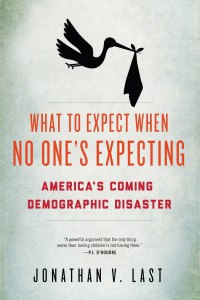
What to Expect When No One’s Expecting: America’s Coming Demographic Disaster is a new book out by the Weekly Standard’s Jonathan Last, and he was available for an interview with me on it and its argument – which is, essentially, that worldwide fertility rates are crashing, for a wide variety of reasons; including ones that we’d rather not change, like lowered infant mortality and increased educational and employment opportunities for women. In point of fact, Jon was available for two interviews… both of which crashed and burned in a fiery software mess. Rather than subject Jon to a third interview, I just pulled a three minute audio clip that was salvageable and will review the book generally.
jonathan-last-interview
To sum up What to Expect When No One’s Expecting is in some ways easy; it’s a numbers-driven book that points out the global drop in fertility, and attempts to look at some of the reasons why it’s been happening. It’s also, pretty deliberately, not a sentimental book; there’s a good deal of zero-sum in it. To give just one example: one major reason that fertility has dropped in the US is because we’re sending more people (especially women) to college. Jonathan Last thinks – as do I – that this is a good thing for our society, and obviously it’s a good thing for women… but it’s still bad for our fertility rate, and there’s really no way to get around that. There are, in fact, no really good and easy answers to the problem (and, as Jonathan points out, the historical record shows that population decline is heavily associated with general societal problems); to go back to the example, Western Europe’s attempts to make it easier for working mothers to have no children seem successful, but they also require a good deal of constant effort for somewhat modest gains. Which is something that is, generally speaking, impolitic to say or write in public. Continue reading RS Interview/Review: What to Expect When No One’s Expecting.

